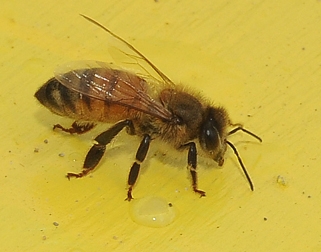
The Davis Bee Sanctuary is the place to "bee" on Saturday, March 31.
That's when the Davis Bee Collective, a community of small-scale beekeepers founded by a former UC Davis entomology graduate student, will host the grand opening of their newly landscaped apiary, aptly named the "Davis Bee Sanctuary."
The event, open to the public, is scheduled from 1 to 5 p.m. at the site on Orchard Park Drive, Davis. The main ceremony starts at 1 p.m. However, folks will be filtering in and out from 11 a.m. to 6 p.m., said Derek Downey, a seven-year beekeeper who coordinates the Davis Bee Collective and the Davis Bee Sanctuary.
Where is the Davis Bee Sanctuary? It's adjacent to the western edge of The Domes, a cooperative student housing community known for its dome-shaped structures. If you drive past The Domes on Orchard Park Drive, you'll see the Bee Sanctuary at the end of the street.
Ant specialist Eli Sarnat, who received his doctorate in entomology from UC Davis in 2009, founded the Davis Bee Collective in 2005. Now residing in Happy Camp, Siskiyou County, Sarnat is a postdoctoral researcher based at the University of Illinois, Urbana. And yes, he still keeps bees. He and a beekeeping partner maintain about 20 hives in Happy Camp.
His friend, Derek Downey, who received his bachelor's degree in engineering from UC Davis in 2009, joined the Bee Collective in 2005. Then in 2011, Downey founded The Bee Sanctuary as the place to keep the bees.
Downey owns and operates a small beekeeping business, the Davis Bee Charmers; he catches swarms, relocates hives, and teaches beekeeping lessons to individuals and groups.
Among those participating in the work parties at the Bee Sanctuary, held every Sunday from 1 to 4 p.m., are Melanie Lataste and her husband, Pierre Arrial of Nantes, France. Arrial is a postdoctoral scholar in the UC Davis Department of Geology.
What's on tap Saturday, March 31? "Come meet the beekeepers," Downey says. The event will include tours, honey tasting, a permaculture lesson covering hugelkultur (the drought-tolerant technique being used at the sanctuary), a free flower giveaway, seed exchange (bring seeds), and a presentation on native bees, which also will be sharing the sanctuary.
A special guest will be Extension apiculturist Eric Mussen of the UC Davis Department of Entomology.
Downey invites interested persons to join the Bee Collective and Bee Sanctuary; information on how to join is on the Davis Wiki website. Downey moderates the Google group and adds new members. "If someone wants to just help out and learn about bees, they are always welcome to take part," he said. "We will have hives that are collectively managed so everyone can learn together. If someone wants to keep their own hive there, it is first-come, first served. We have space for 10 to 12 hives, max."
Members of the Bee Collective share resources, such as beekeeping equipment, books, and tools. Downey accepts donations for the Bee Collective and Bee Sanctuary (email him at davisbeecharmers@gmail.com). He recently received dozens of donated perennials.
One of the hives at the sanctuary is actually a birdhouse, or what Mussen calls "a birdhouse for wood ducks." Davis homeowners "installed it to invite birds to live in it," Downey said, but a swarm of honey bees soon claimed it. So, Downey moved the birdhouse--bees and all--into the sanctuary.
Today (Tuesday, March 20) the bees in the birdhouse swarmed, as expected. They're now occupying a nearby hive in the sanctuary.
Downey anticipates filling the other empty hives soon with swarms.
Attached Images:

Derek Downey checks out a birdhouse filled with bees. The bees swarmed March 30 and are now established in a once-vacant bee box in the sanctuary. (Photo by Kathy Keatley Garvey)

Melanie Lataste examines a frame of honey. She and her husband, Pierre Arrial, are new members of the Bee Collective.